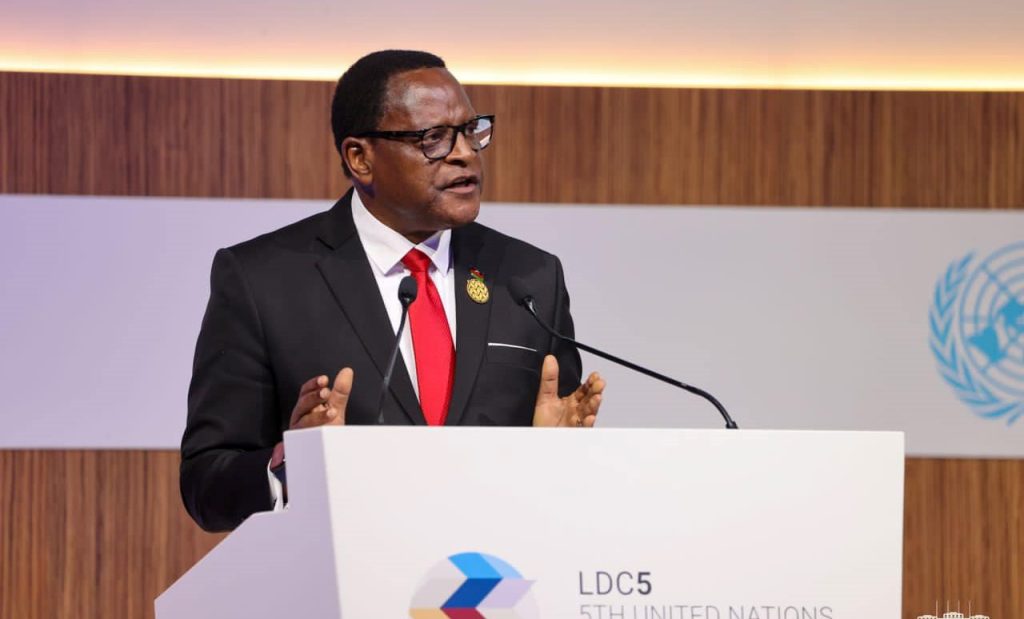Chakwera wants no more LDCs summits
President Lazarus Chakwera was chairperson of the world’s Least Developed Countries (LDCs) during this year’s summit that closed last week in Doha, Qatar. At that summit, countries and stakeholders made commitments ranging from improving biodiversity and tackling malnutrition to resilience building. Our News Analyst FRANK NAMANGALE looks into what transpired at the summit.
President Chakwera, speaking as the outgoing chairperson of the LDCs global coordination bureau during the closing session, said he looks forward to a day in the near future when there will be no LDCs Summits.

He said: “What I look forward to is that day in the near future when our shared aspirations to graduate all 46 of our economies to middle-income status would have been fulfilled.
“What I look forward to is that day in the near future when the Doha Programme of Action [DPoA] would have become the Doha Celebration of Achievement. And I believe that we have what it takes to reach that day together, leaving no one behind. So, when that day comes, I expect to see you there, every one of you. It is what your nation deserves.”
Chakwera further told delegates that the LDCs must develop, adding that that was not negotiable.
Chakwera said this was urgent to achieve the 2030 United Nations (UN) Sustainable Development Goals (SDGs) and failure to develop would spell disaster for the global community.
“Building stronger and deeper partnerships among the global community to implement the transition of LDCs to middle-income status is, therefore, the urgent task of our day,” Chakwera said.
UN Deputy Secretary General Amina Mohammed said achieving the SDGs in the LDCs is a litmus test for achieving the 2030 agenda.
“That is why the [DPoA] must be seen as a vehicle for SDG Acceleration,” Mohammed said.
Under the theme ‘From Potential to Prosperity’, the conference aimed at driving transformational change to positively affect the 1.2 billion people who live in the LDCs.
“The commitments made at the summit are a true embodiment of global solidarity and partnership and will pave the way for a new era of international cooperation,” said Rabab Fatima, Secretary General of the Conference and UN High Representative for the LDCs, Landlocked Developing Countries and Small Island Developing States.
“This will result in more of the LDCs achieving the goal of graduation and a more prosperous and sustainable future,” she added, according to UN News.
According to the UN, discussions at LDC5 centred around delivery of the DPoA for the LDCs by 2031through strengthened commitments between the least developed countries and their partners, including the private sector, civil society and governments.
The bloc agreed in 2022, after LDC5 was postponed due to Covid-19, to outline a transformative agenda to tap into the potential of the LDCs, according to Mohammed.
She said agreements reached last week would help the LDCs to address the ongoing impacts of the Covid-19 pandemic to return to a pathway to achieve the SDGs, address climate change and make strides towards sustainable and irreversible graduation.
Mohammed said: “More than 5 000 participants attended LDC5, including 47 Heads of State and Government and 130 ministers. They called for developed countries to urgently provide the most vulnerable countries with the assistance they need to drive socio-economic and environmental development.
“Corporate leaders together with civil society, youth and other partners shared plans, innovations and recommendations in several areas, including enhancing the participation of LDCs in international trade and regional integration to addressing climate change, strengthening global partnerships, supporting graduation and leveraging the power of science, technology and innovation.”
In her article, the Kenyan diplomat said there are currently 46 economies designated by the UN as LDCs, entitling them to preferential market access, aid, special technical assistance and capacity-building on technology among other concessions.
These 46 LDCs are distributed among the following regions; Africa (33 countries), Asia (nine countries) Pacific (three countries) and one country from the Caribbean.
the African member-States include Angola, Benin, Burkina Faso, Burundi, Comoros, the Democratic Republic of the Congo, Ethiopia, Gambia, Malawi, Mozambique, Tanzania and Zambia while from Asia the countries include Afghanistan, Bangladesh, Cambodia, Myanmar, Nepal and Yemen.
the Pacific has Kiribati, Solomon Islands and Tuvalu Caribbean and the Caribbean only has Haiti.
Mohammed said Vanuatu was the latest country to graduate from the category in late 2020, adding that Bhutan is next to graduate in late 2023.
The Doha Political Declaration, adopted last week, she said, reinforces the international community’s commitment to the DPofA.
The conference has presented a unique opportunity to translate the vision of the Doha Programme into tangible results with countries and stakeholders showcasing a host of commitments, according to Mohammed.
The commitments range from improving biodiversity and tackling malnutrition to resilience building in the LDCs.
Qatar announced a financial package of $60 million; $10 million to support the implementation of the DPoA and $50 million to help build resilience in the LDCs.
Germany dedicated €200 million in 2023 for financing LDCs, Canada announced $59 million to deliver Vitamin supplements in 15 LDCs and ecosystem conservation in Burkina Faso and the European Union Commission announced cooperation agreements advancing sustainable investments in Africa totalling more than €130 million of investment.
Finland, according to the UN, announced an annual event called the UN LDC Future Forum in Helsinki, with the Office of the UN High Representative for the LDC, Landlocked Developing Countries and Small Island Developing States – OHRLLS, to ensure the latest thinking and research is being put to work to ensure progress on the most vulnerable states.
There were several other financial packages made towards LDCs.






of course like your website but you have to check the spelling on several of your posts. A number of them are rife with spelling issues and I in finding it very troublesome to inform the reality on the other hand I will certainly come back again.